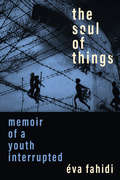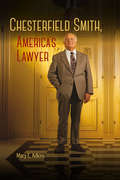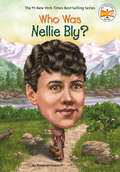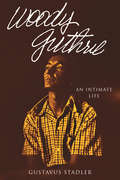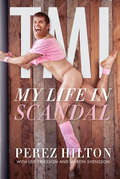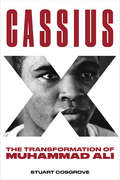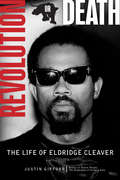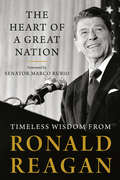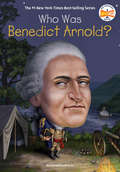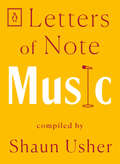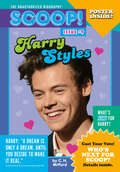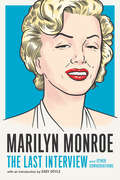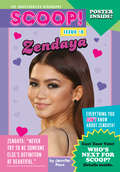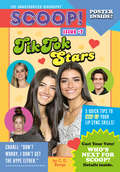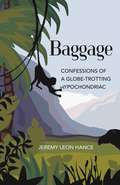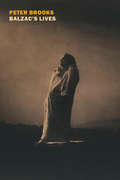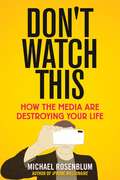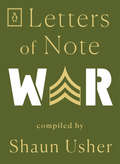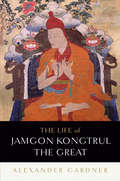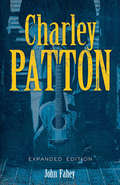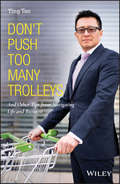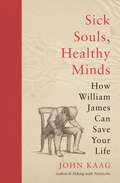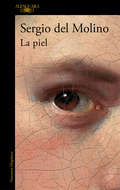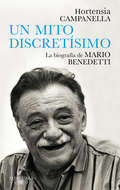- Table View
- List View
The Soul of Things: Memoir of a Youth Interrupted
by Éva FahidiAn exceptional document of an extraordinary life, The Soul of Things is the memoir of Holocaust survivor Éva Fahidi. Since the memoir was first published in Hungarian in 2004 under the title Anima Rerum, Fahidi has become a household name in Hungary and in Germany. Featured in countless interviews and several prize-winning documentary films, at the age of ninety-five she is a frequent speaker at Holocaust commemorations in Hungary, Germany, and elsewhere. The Soul of Things combines a rare depiction of upper-middle-class Jewish life in pre-war Hungary with the chronicle of a woman’s deportation and survival in the camps. Fahidi is a gifted writer with a unique voice, full of wisdom, humanity, and flashes of dark humour. With an unsentimental, philosophical perspective, she recounts her journey from the Great Hungarian Plain to the extermination camp of Auschwitz-Birkenau, the forced labour camp of Münchmühle, and back. The English edition includes a new introduction by historians Éva Kovács and Judith Szapor, the original prefaces to the Hungarian and German editions, an essay on the Münchmüle Camp by Fritz Brinkman-Frisch, and extensive notes providing historical and cultural context for Fahidi’s narrative.
Chesterfield Smith, America's Lawyer
by Mary E. AdkinsChesterfield Smith spearheaded the American Bar Association’s condemnation of Richard M. Nixon during the Watergate scandal. Smith’s damning statement “No man is above the law” turned him into a national figure. But his outsized accomplishments, and equally outsized personality, had already made the Florida attorney a legend in his home state.Mary Adkins’s biography follows the epic life of a person driven by the motto “do good.” A child of the rural South turned war hero, Smith put himself through law school and rose fast to lead the Florida Bar and mastermind the drafting of a new state constitution. At the same time, he grew his small firm into Holland & Knight, a legal leviathan he imbued with his own sense of public duty. His idealism further manifested in his hiring of women and people of color while his expansive professional network led to a close friendship with future Supreme Court justice Ruth Bader Ginsburg. Adkins also examines Smith’s mentoring of several outstanding legal figures and the community service organizations still influenced by his humane vision of the law.Fully realized and long overdue, Chesterfield Smith, America’s Lawyer illuminates the complexities of a defining Florida figure who became a legal giant.
Who Was Nellie Bly? (Who Was?)
by Margaret Gurevich Who HQGet ready to journey around the world with Nellie Bly--one of America's first investigative journalists. Elizabeth Cochrane Seaman had no idea that the open letter she'd written to a local newspaper in Pittsburgh in 1885 would change her life forever. The editor of the paper was so impressed with her writing, that he offered her a job! She'd later change her name to Nellie Bly and work as an investigative reporter in New York City. Known for her extraordinary and record-breaking trip around the world and her undercover investigation of a mental institution, Nellie Bly was one of the first female investigative reporters in the United States and a pioneer in the field of journalism.
Woody Guthrie: An Intimate Life
by Gustavus StadlerDismantles the Woody Guthrie we have been taught--the rough-and-ready ramblin' man--to reveal an artist who discovered how intimacy is crucial for political struggleWoody Guthrie is often mythologized as the classic American "ramblin' man," a real-life Steinbeckian folk hero who fought for working-class interests and inspired Bob Dylan. Biographers and fans frame him as a foe of fascism and focus on his politically charged folk songs. What's left unexamined is how the bulk of Guthrie's work--most of which is unpublished or little known--delves into the importance of intimacy in his personal and political life. Featuring an insert with personal photos of Guthrie's family and previously unknown paintings, Woody Guthrie: An Intimate Life is a fresh and contemporary analysis of the overlapping influences of sexuality, politics, and disability on the art and mind of an American folk icon.Part biography, part cultural history of the Left, Woody Guthrie offers a stunning revelation about America's quintessential folk legend, who serves as a guiding light for leftist movements today. In his close relationship with dancer Marjorie Mazia, Guthrie discovered a restorative way of thinking about the body, which provided a salve for the trauma of his childhood and the slowly debilitating effects of Huntington's disease. Rejecting bodily shame and embracing the power of sexuality, he came to believe that intimacy was the linchpin for political struggle. By closely connecting to others, society could combat the customary emotional states of capitalist cultures: loneliness and isolation. Using intimacy as one's weapon, Guthrie believed we could fight fascism's seductive call.
TMI: My Life in Scandal
by Perez Hilton Leif Eriksson Martin SvenssonThe story of how Mario Lavandeira became Perez Hilton, the world's first and biggest celebrity blogger. With Perez's help, many promising young artists reached the masses – Katy Perry, Adele, Amy Winehouse, and Lady Gaga, to name a few. Soon Perez was a Hollywood insider, but after a dramatic fallout with Lady Gaga, his blog became increasingly mean. When people called him a bully and a hypocrite for outing gay celebrities, Perez was forced to reevaluate not only his alter ego, but also himself. TMI reveals the man behind the blog in a new, revealing, and still juicy memoir.
Cassius X: The Transformation of Muhammad Ali
by Stuart CosgroveAlthough Muhammad Ali's decision to assume a new name has often been portrayed as a sudden transformation, Cassius Clay's conversion to Islam was a process, not an event. For many months he received guidance from Malcolm X, who had traveled from Harlem to Miami to be his mentor as he studied for his entry into the deeply divided and fratricidal Nation of Islam. The name he assumed over those now-forgotten months was Cassius X. This is the story of Cassius X over twelve months in Miami, a city that was changing faster than America itself, as he trains for the fight that will bring him global fame: his world heavyweight title fight against Sonny Liston in February 1964. Change was happening on every conceivable front, not least in music where two significant coincidences brought Cassius X into contact with the two major forces in sixties music: Beatlemania and the newly emergent soul music. The Beatles famously turned up at Clay's training camp at the 5th Street Gym and Sam Cooke negotiated a recording deal for the flamboyant Cassius X. However, his music career, which included a cover version of Ben E. King's "Stand By Me" and a brief love affair with the dance-craze queen Dee Dee Sharp, never came close to echoing his career as a championship fighter. Politically, the Warren Commission, the FBI's "Informant 88," and the philosophical differences between Martin Luther King Jr. and the emergent black power movements were all at work. Cassius X's experiences came to pre-empt and predict the major cultural and ideological shifts that would unfold in the decade ahead.
Revolution or Death: The Life of Eldridge Cleaver
by Justin GiffordIn the 1960s, no black political group stood for grassroots insurgency more than the Black Panther Party. The figure who embodied the militant and controversial spirit of the Black Panther Party more than anyone was Eldridge Cleaver. Charismatic, brilliant, and courageous, Cleaver built a base of power and influence that struck fear deep in the heart of white America. It was therefore shocking to many left-wing radicals when Cleaver turned his back on black revolution, the Nation of Islam, and communism in 1975. While Cleaver seemed sincerely disillusioned with radicalism, his erratic behavior over the next two decades revealed something that had been a latent part of his psyche all along—his narcissistic megalomania. His influence declined significantly through the 1980s until he found himself back on the streets committing petty crimes. By the time he died, in 1998, he was largely viewed as a turncoat who had betrayed the cause of black freedom.How can we make sense of Cleaver's precipitous decline from a position as one of America's most vibrant black writers and activists? And how do his contradictory identities as criminal, party leader, international diplomat, Christian conservative, and Republican politician reveal that he was more than just a traitor to the advancement of civil rights? Revolution or Death answers these questions and many more by providing the first life story of one of the most notorious black revolutionaries in history. It explores the audacious dreams and spiritual transformations of the eccentric radical and places him squarely within the context of his changing times. Author Justin Gifford explores previously unseen materials from Cleaver's extensive archive to create the story of a man far more compelling and complex than anyone has given him credit for. In a country defined by its extreme political positions on the right and left, Cleaver embodied both ideologies in pursuit of his conflicting ideals, and it was his inability to resolve
The Heart of a Great Nation: Timeless Wisdom from Ronald Reagan
by Ronald ReaganWith a foreword from Senator Marco Rubio, a stirring collection of Ronald Reagan's most inspiring speeches, offering his timeless wisdom and guidance for our day.In his 1989 farewell address, Ronald Reagan said, "I wasn't a great communicator, but I communicated great things, and they didn't spring full bloom from my brow, they came from the heart of a great nation--from our experience, our wisdom, and our belief in principles that have guided us for two centuries."The Heart of a Great Nation brings together Reagan's most powerful speeches, as relevant to our chaotic world as they were when he first gave them. In a period of our country's history consumed by economic stagnation, national instability, and the looming threat of communism, Reagan spoke directly to the hearts of everyday Americans. His wisdom on matters of family, freedom, and nationhood helped guide the country back to its founding principles and ushered in an era of prosperity and national pride. Today, as we find our country treading similar ground, Reagan's wisdom speaks to us once again, offering guidance to everyone looking to navigate the present and remember the legacy of this great nation--which can one day be reclaimed.
Who Was Benedict Arnold? (Who Was?)
by James Buckley Who HQFind out how this one-time American hero became the country's most notorious traitor.As a young child, Benedict Arnold never shied away from a fight. So when the French and Indian War began in 1754, Benedict was eager to join the militia and fight for the British colonies in America. And when he was eighteen years old, he got his chance. Arnold had no idea that less than twenty years later, he would be fighting against the British in the Revolutionary War. Now the captain of his own militia, Benedict won the admiration of his troops and George Washington when he captured a major British fort. He continued fighting for the colonies and was even considered a patriotic war hero after being wounded in battle. But in 1780, Benedict made a decision that no one could anticipate. He betrayed his fellow Americans and joined the British army. Author James Buckley Jr. takes us through Benedict's life and explains the events that led him to switch sides and become the most famous turncoat in American history.
Letters of Note: Music (Letters of Note #2)
by Shaun UsherFrom Beethoven and Tchaikovsky to John Lennon Prince and Kim Gordon, tune in to the evocative expressions of treasured composers, musicians, singers, and songwriters in this enchanting volume from the compiler of the bestselling Letters of Note collectionsVerdi writes to his publisher about a man who hated Aida so much that he wants his money back. Keith Richards tells his aunt about bumping into a former schoolmate named Mick Jagger, who also loves Chuck Berry. Yo-Yo Ma wonders whether Leonard Bernstein remembers introducing him onstage as a young boy. A Harvard psychiatrist begs CVS to change their on-hold music. Riffing on their passions and surroundings, the artists and entertainers in this volume candidly reveal the sources of their inspiration, what music means to them, why they create it, and so much more. This rich and engaging collection of 30 letters celebrates the resonance that music, in its many forms and variations, brings to our lives.
Harry Styles: Issue #9 (Scoop! The Unauthorized Biography #9)
by C. H. MitfordA new series of unauthorized biographies on the world's biggest names and rising stars in entertainment, sports, and pop culture! Complete with quizzes, listicles, trivia, and a full-color pull-out poster of the star, this is the definitive collection to get the full Scoop! and more on your favorite celebrities.Harry Styles seemed like your average boy-band-turned-solo-musician act. But when he took a leading role in Christopher Nolan's Dunkirk, Harry showed the world he was anything but a one-trick pony. And with a sophomore smash to follow up his debut album, things are really starting to heat up for this British bloke!So, what's next?Get the full Scoop! and more on Harry Styles: America's favorite Brit-pop super star.
Marilyn Monroe: and Other Conversations (The Last Interview Series)
by Melville House"I'm so many people. They shock me sometimes. I wish I was just me!" --Marilyn MonroeNearly sixty years after her death, Marilyn Monroe remains an icon whom everyone loves but no one really knows. The conversations gathered here--spanning her emergence on the Hollywood scene to just days before her death at age 36--show Monroe at her sharpest and most insightful on the thorny topics of ambition, fame, femininity, desire, and more. Together with an introduction by Sady Doyle, these pieces reveal yet another Marilyn: not the tragic heroine she's become in the popular imagination, but a righteously and justifiably angry figure breaking free of the limitations the world forced on her.
Zendaya: Issue #8 (Scoop! The Unauthorized Biography #8)
by Jennifer PouxA new series of unauthorized biographies on the world's biggest names and rising stars in entertainment, sports, and pop culture! Complete with quizzes, listicles, trivia, and a full-color pull-out poster of the star, this is the definitive collection to get the full Scoop! and more on your favorite celebrities.From her humble beginnings as a backup singer and dancer, Zendaya first made a name for herself as Disney Chanel actress. But when she landed major roles in the Spider-Man franchise and in HBO's Euphoria, Zendaya made the leap from Disney star to Hollywood superstar.But what's next?Get the full Scoop! and more on Zendaya, Hollywood's next A-list actress.
TikTok Stars: Issue #7 (Scoop! The Unauthorized Biography #10)
by C. D. BangsA new series of unauthorized biographies on the world's biggest names and rising stars in entertainment, sports, and pop culture! Complete with quizzes, listicles, trivia, and a full-color pull-out poster of the star, this is the definitive collection to get the full Scoop! and more on your favorite celebrities.What's the hype?Charli D'Amelio was your average high school sophomore. You know, like algebra, social studies, and after-school dance class. But when she posted a duet video to TikTok in August of 2019 that went viral, she became a literal overnight internet sensation. In less than a week, she had 17 million followers. Even Charli admits that she doesn't get the hype either! A year later, Charli is still at it with her sister Dixie and her fellow Hype House stars creating some of the most watched content on the internet.So what's next?Get the full Scoop! and more on Charli D'Amelio and all your favorite TikTok stars!
Baggage: Confessions of a Globe-Trotting Hypochondriac
by Jeremy HanceAn award-winning journalist&’s eco-adventures across the globe with his three traveling companions: his fiancée, his OCD, and his chronic anxiety—a hilarious, wild jaunt that will inspire travelers, environmentalists, and anyone with mental illness. Most travel narratives are written by superb travelers: people who crave adventure, laugh in the face of danger, and rapidly integrate into foreign cultures. But what about someone who is paranoid about traveler&’s diarrhea, incapable of speaking a foreign tongue, and hates not only flying but driving, cycling, motor-biking, and sometimes walking in the full sun? In Baggage: Confessions of a Globe-Trotting Hypochondriac, award-winning writer Jeremy Hance chronicles his hilarious and inspiring adventures as he reconciles his traveling career as an environmental journalist with his severe OCD and anxiety. At the age of twenty-six—after months of visiting doctors, convinced he was dying from whatever disease his brain dreamed up the night before—Hance was diagnosed with OCD. The good news was that he wasn&’t dying; the bad news was that OCD made him a really bad traveler—sometimes just making it to baggage claim was a win. Yet Hance hauls his baggage from the airport and beyond. He takes readers on an armchair trek to some of the most remote corners of the world, from Kenya, where hippos clip the grass and baboons steal film, to Borneo, where macaques raid balconies and the last male Bornean rhino sings, to Guyana, where bats dive-bomb his head as he eats dinner with his partner and flesh-eating ants hide in their pants and their drunk guide leaves them stranded in the rainforest canopy. As he and his partner soldier through the highs and the lows—of altitudes and their relationship—Hance discovers the importance of resilience, the many ways to manage (or not!) mental illness when in stressful situations, how nature can improve your mental health, and why it is so important to push yourself to live a life packed with experiences, even if you struggle daily with a mental health issue.
Balzac's Lives
by Peter BrooksEnter the mind of French literary giant Honoré de Balzac through a study of nine of his greatest characters and the novels they inhabit. Balzac's Lives illuminates the writer's life, era, and work in a completely original way.Balzac, more than anyone, invented the nineteenth-century novel, and Oscar Wilde went so far as to say that Balzac had invented the nineteenth century. But it was above all through the wonderful, unforgettable, extravagant characters that Balzac dreamed up and made flesh—entrepreneurs, bankers, inventors, industrialists, poets, artists, bohemians of both sexes, journalists, aristocrats, politicians, prostitutes—that he brought to life the dynamic forces of an era that ushered in our own. Peter Brooks&’s Balzac&’s Lives is a vivid and searching portrait of a great novelist as revealed through the fictional lives he imagined.
Don't Watch This: How the Media Are Destroying Your Life
by Michael RosenblumAn unfiltered look at the addictive properties of social media, TV, and movies on our culture, with strategies to help you reclaim control over your life. Today, the average person spends an astonishing eight hours a day watching TV or videos online. Watching social media stories, movies, and TV is now our number one activity, outpacing everything else that we do, including sleep. This habit has an incredibly powerful influence on our lives – from what we think to what we buy to whom we elect. Media are more than entertainment; they are a drug. This media addiction wreaks havoc on our mental health, causing increased stress, depression, and anxiety, and ruining personal relationships. It also drives us deeper and deeper into debt. In Don&’t Watch This, former TV producer and Ivy League professor Michael Rosenblum reveals the hidden psychology driving us to media addiction. He describes why solving the problem is not as simple as swearing off our devices, but about learning how to use media for good. Rosenblum reveals the key to getting the best out of technology, without letting it get the best of you. Inside, you&’ll learn: How to take control of the mediaHow to use your phone&’s camera to spread stories worth tellingHow having a former reality TV star in the Oval Office has changed the scope of mediaWhy posting selfies on Instagram isn&’t going to change the world, and what you can post instead Enlightening and empowering, Don&’t Watch This provides actionable, revolutionary techniques and insight to control your media addiction—helping you live the life you really want.
Subway to the Met: Risë Stevens Story
by Kyle CrichtonKyle Chrichton recounts the childhood and opera career of Risë Stevens (1913-2013), who was born in the Bronx and who sang at the Met in the 1940s and 1950s. As this book was published in 1959 and Risë lived to 2013, it does not deal with her post-operatic life. Major influences were her close-knit family, two singing coaches and her husband. She was especially famous for her portrayal of Carmen in the Bizet opera.
Letters of Note: War (Letters of Note #4)
by Shaun UsherA powerful new volume of missives about combat by Alexander Hamilton, General Sherman, Evelyn Waugh, Kurt Vonnegut, and more, from the author of the bestselling Letters of Note collectionsDefeated Cossacks taunt the pompous sultan of the Ottoman Empire. A black corporal beseeches Abraham Lincoln to ensure that his regiment receives proper payment for performing their duties. Mohandas Gandhi urges Adolf Hitler to turn back the tide of war. A suicide bomber in Iraq explains his simple motivation to his family. This poignant collection offers a nuanced and moving look at the act of armed conflict. Each of these 30 remarkable letters sheds light on what it means for us to take up arms against one another and record a piece of that terrible deed. They encapsulate the full experience of battle, from feats of courage and sacrifice to the grief that follows acts of violence, ultimately affirming the power of the written word.
The Life of Jamgon Kongtrul the Great
by Alexander GardnerThe first-ever extensive biography of Tibet's most famous nonsectarian Buddhist lamaKnown as the “king of renunciates,” Jamgon Kongtrul Lodro Taye (1813–1899) forever changed the face of Buddhism through collecting, arranging, and disseminating the various lineage traditions of Tibet across sectarian lines. His extensive treasury collections of profound Buddhist teachings continue to be taught and transmitted throughout the Himalayas by all major traditions and represent the breadth and profundity of Tibetan Buddhist philosophy and practice. Jamgon Kongtrul was a polymath, dedicated retreatant, ritual expert, writer, and teacher from the eastern Tibetan kingdom of Derge. During the nineteenth century, while central Tibet experienced extreme sectarian divides, Jamgon Kongtrul, along with Jamyang Khyentse Wangpo and Chokgyur Lingpa, set about collecting, teaching, and transmitting the major practice traditions found in Tibet. Their activity—much of which did not adhere to the traditional divides of the Tibetan “schools” and included both tantric lineages coming from India as well as Tibetan treasure (terma) lineages—is one of the finest examples of Tibetan ecumenism, or Rimay, and Jamgon Kongtrul is perhaps the most famous among Tibet’s Rimay masters. This is the most accessible work available on Jamgon Kongtrul’s life, writings, and influence, written as a truly engaging historical biography. Alexander Gardner provides an intimate glimpse into the life of one of the most important Tibetan Buddhist teachers to have ever lived.
Charley Patton: Expanded Edition
by John FaheyThe Father of the Delta Blues, Charley Patton (1891–1934) was born and raised around Mississippi's cotton plantations. During the 1920s, he was the first of the region's great stars, performing for packed houses throughout the South and making popular recordings in New York City. His music — ranging from blues and ballads to ragtime and gospel — is distinctive for his gravelly, high-energy singing and the propulsive beat of his guitar. Patton had a lively stage presence, originating many of the guitar-playing antics now associated with Jimi Hendrix and other latter-day musicians. His influence, among both his contemporaries and subsequent blues artists, is incalculable. Noted guitarist John Fahey presents a textual and musicological examination of Patton's music. This new edition of the original 1970 publication is enhanced by Fahey's notes from the Grammy-winning, out-of-print box set Screamin' and Hollerin' the Blues: The Worlds of Charley Patton. Available for the first time outside the set, Fahey's reconsideration of Patton's music offers fresh perspectives and key corrections of the historical record.
Don't Push Too Many Trolleys: And Other Tips from Navigating Life and Business
by Ying TanImprove your personal and professional life with compelling strategies and practical advice Don't Push Too Many Trolleys: And Other Tips from Navigating Life and Business teaches readers ten crucial principles required to succeed in life and business. Written by Ying Tan, Founder and CEO of a multimillion pound financial services company, Don’t Push Too Many Trolleys imparts sage advice suitable for anyone, at any stage of their life. The author describes the attitudes, lessons, and traits that allowed him to become one of the youngest Vice Presidents ever at Goldman Sachs. He shows readers how he built a company from the ground up to create one of the most influential and powerful financial services companies in the UK. Full of concrete strategies and practical advice, this book provides: A deeply personal and humble perspective on success in life and business Actionable advice that makes a real difference in the pursuit of happiness and wealth A front-row seat to the economic meltdown of 2008 and how the author managed to survive it with his business intact Written for entrepreneurs, business people, financial professionals, and anyone else with an interest in improving their personal and professional life by taking full responsibility for their choices and actions, Don’t Push Too Many Trolleys is an indispensable addition to the libraries of people across the world.
Sick Souls, Healthy Minds: How William James Can Save Your Life (Princeton Anz Paperbacks Ser.)
by John KaagFrom the celebrated author of American Philosophy: A Love Story and Hiking with Nietzsche, a compelling introduction to the life-affirming philosophy of William JamesIn 1895, William James, the father of American philosophy, delivered a lecture entitled "Is Life Worth Living?" It was no theoretical question for James, who had contemplated suicide during an existential crisis as a young man a quarter century earlier. Indeed, as John Kaag writes, "James's entire philosophy, from beginning to end, was geared to save a life, his life"—and that's why it just might be able to save yours, too. Sick Souls, Healthy Minds is a compelling introduction to James's life and thought that shows why the founder of pragmatism and empirical psychology—and an inspiration for Alcoholics Anonymous—can still speak so directly and profoundly to anyone struggling to make a life worth living.Kaag tells how James's experiences as one of what he called the "sick-souled," those who think that life might be meaningless, drove him to articulate an ideal of "healthy-mindedness"—an attitude toward life that is open, active, and hopeful, but also realistic about its risks. In fact, all of James's pragmatism, resting on the idea that truth should be judged by its practical consequences for our lives, is a response to, and possible antidote for, crises of meaning that threaten to undo many of us at one time or another. Along the way, Kaag also movingly describes how his own life has been endlessly enriched by James.Eloquent, inspiring, and filled with insight, Sick Souls, Healthy Minds may be the smartest and most important self-help book you'll ever read.
La piel
by Sergio del MolinoSergio del Molino nos lleva a un territorio que nos pertenece a todos: la piel. El autor de La España vacía vuelve para hacer que nos miremos como nunca lo habíamos hecho. «Sergio del Molino mira donde nadie mira y por eso ve lo que nadie ve. Y lo cuenta con trazo de escritor grande.»Iñaki Gabilondo «Tendrá que hacer como yo: mirar a los demás para evitar mirarse a sí mismo.» Los monstruos existen y se pasean entre nosotros, quizá seamos nosotros mismos. Este es el punto de partida de la nueva obra de Sergio del Molino, un viaje que esta vez nos enseña a mirar hacia el territorio más común y a la vez el más individual: la piel humana. Una grave psoriasis, que llena el cuerpo de costras y hace imposible mostrar la desnudez, le sirve al narrador para analizar la vida de diversos personajes conocidos que han sufrido las consecuencias de la mala piel. La vergüenza de sentirse observado y la necesidad de ocultarse, la cultura de la imagen y de la hipermedicalización, el racismo y el clasismo son paradas de este viaje por los secretos que cubrimos con la ropa y que hacen de nuestra piel una frontera con el mundo. La crítica ha dicho...«Sergio del Molino se deja la piel [...]. El escritor deslumbra con unas memorias propias y ajenas, [...] un libro atípico. No se puede catalogar como unas memorias ni tampoco como un ensayo científico, una novela convencional ni un bestiario. [...] Hiere y hace sonreír. Conmueve y escuece. Sacude y divierte. [...] La mejor virtud del libro consiste en la naturalidad de la narración, la atención que suscitan sus vaivenes, la armonía con que se traslada de la ironía a la sensibilidad, del sarcasmo a la angustia, de la erudición al coloquialismo.»Rubén Amón, El Confidencial «Sergio del Molino mira donde nadie mira y por eso ve lo que nadie ve. Y lo cuenta con trazo de escritor grande.»Iñaki Gabilondo «La crónica personal de una enfermedad, la soriasis, pero también una historia cultural de la monstruosidad, del racismo y el estigma. Con apariciones estelares de Nabokov, Cyndi Lauper, Stalin#»Carlos Pardo, Babelia «No sabemos cómo clasificar el libro, es un híbrido. Memorias propias y ajenas. Escrito con sentido del humor, dureza, ironía y mucha lucidez, que habla de lo autobiográfico con todo lo que implica mentir sobre uno mismo. [...] Todos los recuerdos son un ejercicio de ficción, así que nunca sabes cuál es la barrera que separa la memoria de la literatura. [...] Sergio ha escrito un libro extraordinario.»Ahora que el autor no nos oye - La Cultureta (Onda Cero) «Sergio del Molino sabe de lo que habla cuando se detiene en los pormenores de esta maldición cutánea y sabe de lo que escribe cuando juega con los espejos de los monstruos yde la sociedad. [...] Puede que la verdadera memoria se Sergio del Molino se encuentre más en su piel que en sus recuerdos.»Rubén Amón, La Cultureta (Onda Cero) «La piel es una obra sincera y libre y el relato se construye a partir de su condición de enfermo de psoriasis, arriesgando como una buena persona sin complejos y sin miedo a mostrarse cruel o temeroso en según qué circunstancias. [...] Muchos dermatólogos deberían recetar este libro en lugar de muchas cremas con corticoides. [...] Un libro que me ha emocionado muchísimo, un auténtico disfrute.»Isabel Vázquez, La Cultureta (Onda Cero) «Un libro muy entretenido, lleno de caminos, te sorprende y te deja bien desconcertado, esperando qué te va a contar. [...] Un libro de libros, muy recomendable: me hubiese gustado tanto aunque no fuese de un amigo; de hecho, me hubiese gustado aunque fuese de un enemigo.»Guillermo Altares, La Cultureta (Onda Cero) «No es una novela estrictament
Un mito discretísimo: La biografía de Mario Benedetti
by Hortensia CampanellaEDICIÓN REVISADA Y ACTUALIZADA DE LA BIOGRAFÍA DEFINITIVA DE MARIO BENEDETTI Un viaje apasionante por la vida y la trayectoria literaria de un autor fundamental Mario Benedetti es uno de los escritores contemporáneos en español más conocidos y queridos. Narrador, dramaturgo, crítico literario, consiguió, sobre todo con sus relatos y sus poemas, convertirse en uno de los autores más leídos a ambos lados del océano por varias generaciones. Sus versos se comparten, se leen, se recuerdan, se cantan... Hoy, cuando celebramos el centenario de su nacimiento, la edición revisada y actualizada de esta biografía esencial nos contagia el entusiasmo de Benedetti y su lúcido pesimismo, su coraje y su compromiso, su constancia y su honestidad. Hortensia Campanella nos enseña la completa dimensión del hombre que está detrás de una obra literaria sin igual. Un mito discretísimo ilumina todas las aristas de este escritor humilde, al que le gustaba estar alejado de homenajes y fastos pero que nos ha legado una obra universal como pocas. En palabras de la autora, «la vida y la obra de Mario Benedetti conservan una armonía especial que recae como un influjo, como una fuerza, como un regalo, sobre los lectores». Críticas:«Hortensia Campanella se encarga de ponerle sal y fuego a la memoria de Benedetti.»Juan Cruz, El País «Un trabajo que va a ser referencia indispensable para cualquier biografía futura del escritor uruguayo, y asimismo un libro de gran interés para sus muchos seguidores e incondicionales. Primero porque resulta de lectura fácil y amena debido a que está muy bien escrito, y segundo porque aporta una valiosa información personal y bibliográfica. Pero detrás de tanta discreción sigue quedando oculto un ser que adivinamos noble y digno de ser conocido entoda su profundidad, incluidas sus contradicciones.»Javier Fernández de Castro, El Boomeran (g) «Un libro intenso.»Diario de Navarra
